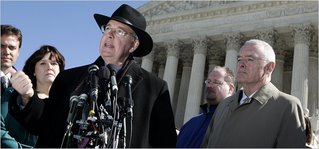The Iranian kidnapping incident
Why has Iran kidnapped 15 British soldiers, forcing an international incident that is becoming increasingly perilous and dangerous -- not just for the poor soldiers, but for the entire world?
Some theories:
1. The British soldiers really were in Iranian waters. If this were true, then Iran's actions make some sense -- Iran, like any other country, does have the right to protect the territorial integrity of its water. The problem with this explanation is that seems unlikely to be true; the Iranian government initially provided coordinates that demonstrated the soldiers were in Iraqi waters.
2. Iran is an irrational state with no coherent strategy. Just as Robert Mugabe is driving Zimbabwe into ruin, and just as Kim Jong-Il is happy to see his own citizens starve, the mullahs of Iran increasingly look as if they are eager to join the "insane world leaders" club. I think this is unlikely too, because no country has benefitted more from the Iraqi invasion than Iran, and the mullahs are more savvy than crazy.
3. The mullahs are trying to shore up domestic support. Internal Iranian politics remain somewhat of a black box, and Iran's President Assholejabadieni may not be sitting well with Iran's young, educated populace. If that's so, the mullahs might be trying to get into a "Wag the Dog" situation and bolstering their popularity. This would explain the televised confession of the female soldier, but apart from that, I have no evidence to support this theory.
4. Iran is trying to probe the boundaries and international constraints on its behavior. Assume Iran is a "rational actor" state, i.e., Iran acts in rational pursuit of its self-interest. Assume as well that Iran is poised to exert increasing military and political influence ove the entire Middle East, and may soon be engaged in a Middle Eastern Cold War with Sunni states such as Syria and Saudi Arabia. Assume finally that Iran is pursuing an active nuclear weapons program that may be operational within 5-10 years.
If these assumptions are true, then it makes sense that Iran needs to find out what constraints the international community will put on its behavior. Unlike the Cold War, where the US and the USSR essentially did whatever they wanted to, Iran knows it is about to enter a dangerous (but exciting!) new realm. Already Iran is facing new pressure as a result of the weapons being funneled to Iraqi insurgents, the concern over its nuclear program, and the anti-Semitic ramblings of its President. Iran wants to know just how much pressure it can put on large states allied with the US, such as, say, Britain.


